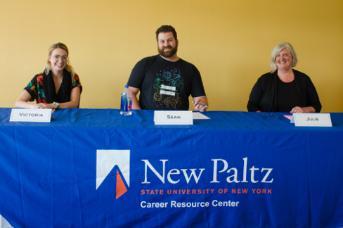Message from the Dean

Politicians often point to liberal arts degrees as less useful than professional degrees, but we know that’s not true. We know that today’s graduates are likely to be employed in many jobs before they retire; some statistics cite seven to 10, so narrow job training won’t serve most people because it doesn’t develop the flexibility of mind and the analytical tools necessary to teach themselves new skills for jobs that may not yet even exist. Moreover, we know that liberal arts graduates perform very competitively in salary comparisons with their professional counterparts, especially by mid-career, so we can’t always judge their success by their first job. But let’s not forget that job placement and salary, while important, are not the only considerations in job and life satisfaction. We spend almost of a third of our lives working, and we hope that something more is at stake than an income. Job satisfaction requires a sense that we are doing something meaningful, providing a valuable service. Degrees in the liberal arts not only open up a wide array of career opportunities, but they also prod us to challenge ourselves and to continue to grow so that our jobs are more than sources of income; they are part of our life’s work.













